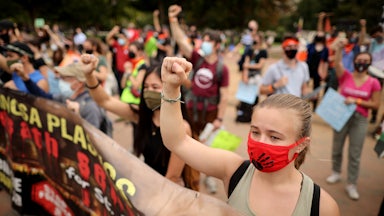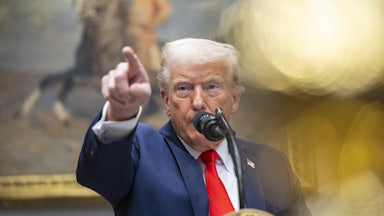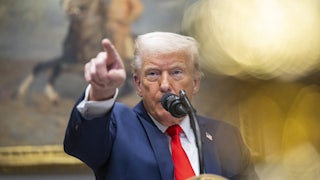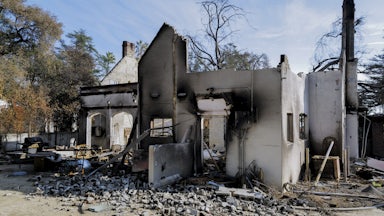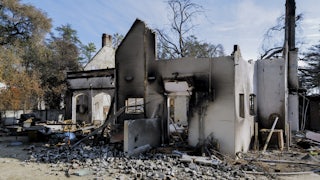“This is an emergency, an emergency,” President Biden reiterated against a scorched earth Massachusetts background on Wednesday, referring to the climate crisis, “and I will look at it that way.”
He didn’t offer much proof of concept. For one thing, he stopped short of actually declaring a national emergency—a much-discussed move that Biden was reportedly considering, and that would open up extra executive powers to deal with the crisis. Instead, the actions Biden announced in his address included diverting $2.3 billion of existing Federal Emergency Management funds to help cope with climate disasters ranging from heat waves to floods and fires. The White House will also expand the Low Income Home Energy Assistance Program to help people pay the high cost of cooling their homes in extreme temperatures and direct the Department of Interior to green-light more offshore wind development. More might be coming.
Speaking to The New York Times, State Department climate envoy John Kerry suggested that it was a matter of when, not if, Biden declares a climate emergency—a longtime rallying cry from green groups eager to see the administration leverage the full weight of the executive branch to bring down emissions. If Biden does declare a climate emergency sometime soon, though, it’ll be the start of a new fight for climate advocates, not the end.
A consequence of the United States having funneled increasing power into its executive in the name of fighting wars is that the authority that branch enjoys is expansive. On climate, the administration has the power to tap into the Defense Production Act to boost clean energy development, as Biden has already done. The Center for Biological Diversity has cataloged the array of other tools at Biden’s disposal, including if he declares an emergency: reinstating the long-standing crude oil export ban, suspending offshore drilling leases, ensuring that FEMA rebuilds clean energy when storms take out fossil fuel infrastructure.
The White House has so far been reluctant to use such tools out of fear that it would spark retaliation from coal baron slash West Virginia Senator Joe Manchin, whose campaign donors and family business would stand to take a hit from more stringent regulations and a beefed-up clean energy sector. Manchin has now declared he won’t vote for climate measures as part of a reconciliation package. Theoretically, this allows Biden to take off the gloves.
Will he, though? An emergency declaration expands the permission slip of things that Biden is able to do. It doesn’t necessarily mean he’ll do them. So far, the emergency stops the White House has been willing to pull have been geared toward making gas cheaper: a historic sale from the Strategic Petroleum Reserve, approvals for a slate of new fossil fuel infrastructure, waiving a ban on ethanol use in the summer, fist-bumping Saudi Crown Prince Mohammed bin Salman. Earth’s atmosphere is ambivalent about whether an emergency is declared. What matters is the emissions produced. An emergency move to keep gas cheap, that is, could easily undermine one to save the planet.
An emergency declaration doesn’t change the balance of forces in society so much as create a new contest over them. The now all but certain death of Build Back Better’s climate provisions has shown that those eager for some kind of climate action—including the White House itself—have lost this round. A national emergency declaration could present another fight: battling over the scope and scale of what Biden does. And there’s plenty of reason to be skeptical about handing a blank check over to the president. Traditionally the U.S. has responded to emergencies by starting wars and creating new kinds of cops, like it did in crafting the paranoid Frankenstein’s monster known as the Department of Homeland Security after September 11. As his team was getting settled in 2020, John Kerry positively referenced Plan Colombia—a U.S.-funded counterinsurgency effort that helped terrorize Colombians in the name of prosecuting a “war on drugs”—as a model for climate action. On a more mundane level, the label of “national emergency” could lead the government to allow solar companies to run slipshod over labor law, for instance, or bypass necessary community and environmental reviews of new clean energy projects.
All that’s to say that there’s reason to be vigilant about an emergency declaration—just as there’s reason to be vigilant about the lack of one as we hurtle toward two degrees Celsius (3.6 degrees Fahrenheit) of warming. Nothing about the way the Biden administration has acted so far should indicate that the White House will either do what’s needed on climate or ably navigate the political complexities of confronting the climate crisis as the public worries about energy prices. With hopes for congressional climate action mostly dashed, there aren’t many good alternatives left to executive action. Climate advocates have spent years drafting plans for how the White House could slash emissions without Congress. Now they’ll have to fight for them, whether Biden declares a climate emergency or not.





